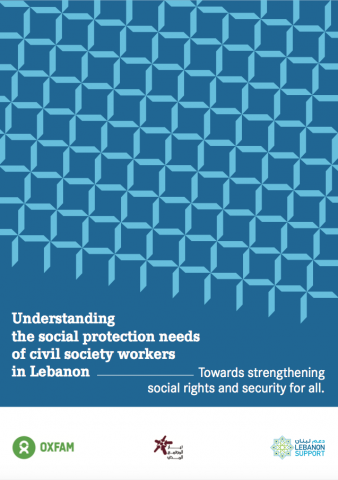Understanding the social protection needs of civil society workers in Lebanon. Towards strengthening social rights and security for all.

The social protection landscape in Lebanon is characterised by its fragmentation and exclusionary nature, leaving the most vulnerable and marginalised with little access to any kind of safety net. Workers in the civil society sector are particularly affected by this situation notably as a result of the increased casualisation of employment within the sector, and of more structural factors inherent to financing mechanisms and streams of nonprofits. Civil society sector employees are, as such, often informal workers, and on short-term contracts. Even workers with fixed or open term contracts remain excluded from protection mechanisms as many NGOs struggle with their own institutional sustainability and face challenges in, notably, covering their staff’s social protection costs from their budgets. This renders this category of workers, that is largely composed of women, particularly vulnerable.
This action-oriented research aims to inform practitioners and decision makers on social protection status, needs and gaps of workers in the civil society sector. It formulates targeted recommendations that aim at enhancing access to civil society workers to social protection, and that target the Lebanese state, the donor community and international NGOs, and local NGOs.
يتّسم مشهد الحماية الاجتماعيّة في لبنان بالتشظّي وبطبيعته الإقصائيّة، ما يحدّ من وصول الأشخاص الأكثر ضعفاً وتهميشاً إلى شبكات الحماية، من أيّ نوع كانت. يؤثّر هذا الوضع في العاملين في قطاع المجتمع المدنيّ بشكل خاصّ، لا سيّما كنتيجة للإضعاف المتزايد للعمل الذي يشهده القطاع، بالإضافة إلى عوامل أخرى أكثر بنيوية، تتلازم مع آليّات التمويل الخاصّة بالمنظّمات غير الربحية. بالتالي، غالباً ما يكون الموظّفون في قطاع المجتمع المدنيّ عاملين غير رسميّين بعقود قصيرة الأمد. ومع ذلك، يبقى العاملون بعقود ذات مدّة محدّدة أو غير محدّدة هم أيضاً في حالة إقصاء عن آليّات الحماية لأنّ منظّمات غير حكوميّة عدّة تجد صعوبة في الحفاظ على استدامتها المؤسّسيّة وتواجه تحدّيات، لا سيّما في تغطية تكاليف الحماية الاجتماعيّة لموظّفيها بالاعتماد على ميزانيّاتها الخاصّة، ما يجعل فئة العاملين هذه، المؤلّفة بنسبة كبيرة من النساء، ضعيفة للغاية.

